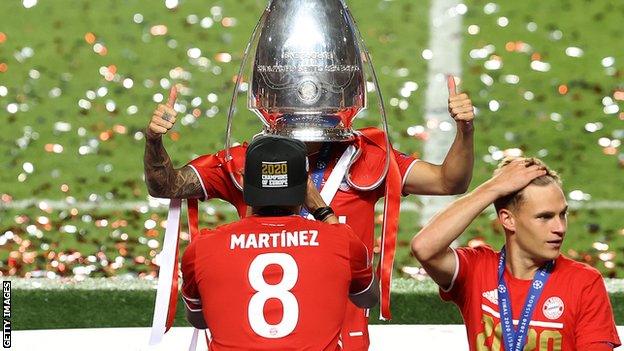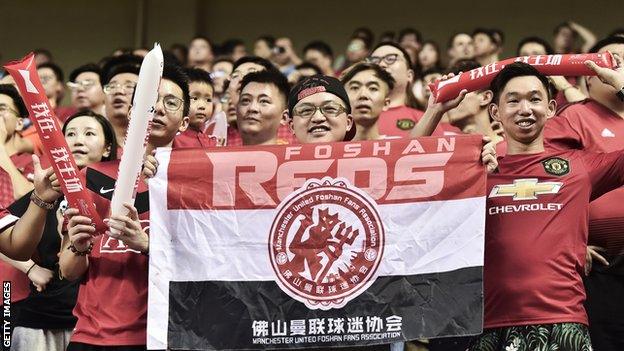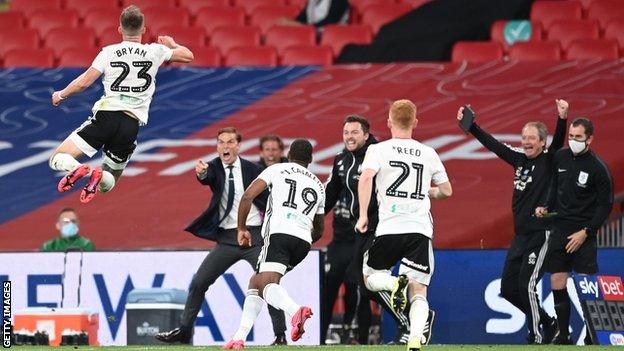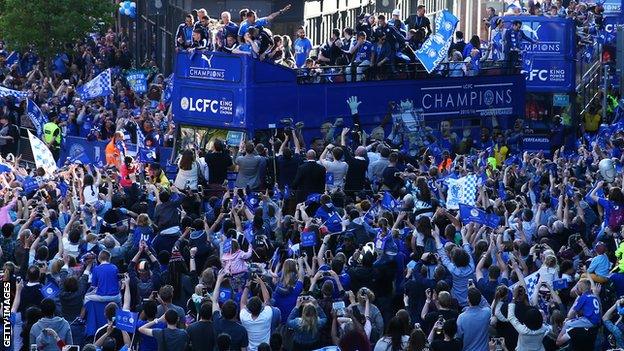Why football is facing major change, despite 'toxicity' of Project Big Picture plan
- Published


The Champions League group stage is likely to be expanded in one of many changes set to affect English football's calendar and structure
When Premier League chief executive Richard Masters addressed a parliamentary hearing on 10 November, he delivered a line all English football could agree on, despite the fierce opposition that followed Project Big Picture's unexpected unveiling a month before.
"Change is coming."
Masters was talking about the situation in Europe, where negotiations around the expansion of Uefa's club competitions have been taking place for 17 months now.
However, if England's so-called 'big six' clubs have their way, that "change" will be far more extensive than what appears set to happen on the continent - an expanded format for all European club competitions, including the Champions League group stage.
An 18-team Premier League, no more EFL Cup or Community Shield, B teams, the scrapping of FA Cup replays. All these were mentioned within the Project Big Picture proposals, which became public ahead of schedule at the beginning of October when they were leaked to the Daily Telegraph.
"Everything is up for discussion. Nothing is off the table," Football Association chairman Greg Clarke told the same Digital, Culture, Media and Sport (DCMS) committee, exactly 27 minutes before he came out with the words that consigned his tenure to the bin.
These options are all controversial. But most contentious of all, in a document that laid out plans to address the massive funding gap between the Premier League and the rest of English football, was the demand for voting power to be concentrated in the hands of a minority of clubs.
Following the widespread criticism that met its public release, it might have appeared to some observers as if the proposed changes in Project Big Picture had been scrapped.
As we will see, this is not the case. The story is far from over.
This is the messy reality now facing elite English football, where unity and compromise are in short supply, during a financial crisis threatening the wider game.
To understand how we got here, and where we are headed next, we need to wind back to 2019. Our starting point is in the south Mediterranean.

Over two days of talks in Malta, in June 2019, it became clear the writing was on the wall. The status quo could not last.
European Clubs' Association members from 48 countries had met to discuss their issues with the continent's competition structures.
Several men in particular had arrived in a hurry. Five representatives from England's 'big six' left a Premier League meeting in Yorkshire early to jump on a private plane and head straight to Malta.
The sight of Tottenham's Daniel Levy, Chelsea's Bruce Buck, Manchester City's Ferran Soriano, Ed Woodward of Manchester United and Arsenal's Vinai Venkatesham arriving en masse showed they meant business. Liverpool chief executive Peter Moore had not been in Yorkshire and travelled independently on Ryanair.
The proposals being discussed - and favoured by a large majority - would mean more European games. That would mean more money for each participant in an expanded Champions League.
The Premier League had made its feelings known the day before. 'More Europe' was definitely not to its liking. "We believe the proposals would be detrimental to domestic leagues across the continent," a statement read.
Nonetheless, those present understood what was in the air. On leaving the meeting, a senior English club executive came out with the line that Masters was to repeat 15 months later: "Change is coming whether we like it or not. We have to work with it, not against it."
Various ideas have been mooted, on European expansion. Four groups of eight teams, six groups of six, a 36-team group phase where each team plays 10 different opponents. Even a repeat of last season's 'Super Eight' knockout tournament. This would be replicated across the Champions League, the Europa League and Uefa's new competition to be launched in June 2021, the Europa Conference League.
This expansion is aimed at increasing broadcasting revenues - at a time when England's have started to dip. It is also trying to address concerns shared by some of Europe's most historic clubs, over being left behind because they do not compete in the continent's five richest leagues, with the Premier League at its head.
Liverpool's Moore reported back to owner John Henry, Woodward did the same with Manchester United co-chairman Joel Glazer. By the time Uefa's next club tournament broadcasting contract begins in 2024, they all realised, clubs were going to be asked to play more European matches on spare dates that - in England's congested calendar - simply do not exist.
Henry had known this problem was brewing. And he believed the Premier League's voting structure would work against what he saw as the solution. With decisions requiring a two-thirds majority, he felt there were 14 clubs working against the 'big six'.

Manchester United fans supporting their team during a 2019 pre-season meeting with Tottenham in Shanghai, China
Between them, Arsenal, Chelsea, Liverpool, Manchester City, Manchester United and Tottenham are England's richest and best-known clubs. They have most of the top players. They are the teams TV subscribers worldwide want to see at home. Yet they cannot drive the Premier League for their own objectives. Reaching agreement is a frustrating process, as with the return of five substitutes, which City's Pep Guardiola and Liverpool's Jurgen Klopp are desperate for, but others, including Aston Villa manager Dean Smith, reject.
From a wider perspective, the 'six' feel commercial decisions are repeatedly taken on a short-term basis, which restricts their ability to grow their income and compete with the likes of Netflix in an expanding digital media world.
In their view, the voting structure gives disproportionate weight to the opinions of clubs who may not even be in the league in 12 months' time and whose financial outlook is framed by what happens now, not in 10 years.
Occasionally, breakaways have been threatened - around Project Big Picture a mass move into the Championship was mentioned - but have never gone anywhere. In the short term, it is likely that without ex-FA chairman Clarke's involvement earlier this year, Henry, Glazer and the rest would have kept grumbling and done nothing.
However, Clarke changed the narrative by reaching out to Chelsea chairman Bruce Buck in January to chat about the future of English game amid what he considered to be a very real prospect of a breakaway European Super League (ESL).
This concept is felt by many to be the threat Europe's biggest clubs routinely use in an effort to get their own way.
Indeed, in his exit speech as Barcelona president in October, Josep Maria Bartomeu said he had signed the club up to the idea - but no evidence has been presented to show this is the case. A clear issue is that operating outside the umbrella of world governing body Fifa would deny the players of those clubs access to their national teams.
Beyond that, those who refuse to believe an ESL is possible wonder if any of the clubs likely to be involved had ever thought of the consequences of finishing last in such a competition - as someone would have to - given their entire existence is built around success at the top end of elite football.
Clarke adopted a more cautious view, saying it would be "foolish in the extreme" to discount the potential for private equity investors to view top-level football as an investment vehicle. In other words; with enough money involved all obstacles might be overcome, and perhaps Fifa's power would be marginalised. Maybe the very best international footballers would simply no longer play in competitions like the World Cup if alternative structures were more lucrative. After all, cricket witnessed similar in the late 1970s with Kerry Packer's World Series., external
In suggesting to Buck that talks should be opened up to include another couple of clubs and the Premier League and EFL, Clarke was trying to address the situation as he saw it, while finding a solution for structural problems further down the pyramid. There was no Premier League representation in the talks that took place, and eventually resulted in Project Big Picture.
Then Covid-19 took the game in its grip. The 'big six' had something they could offer and virtually everyone else desperately needed - money.
On 5 May, EFL chairman Rick Parry told a DCMS committee his member clubs were staring at a "£200m black hole". But the vastly experienced former Liverpool chief executive, the first person to run the Premier League, knew he had a wider challenge: trying to smooth what has become a cliff edge between the Premier League and Championship.

Fulham celebrate during their Championship play-off final victory over Brentford at Wembley in August
The Championship play-off final is billed as football's 'richest game'. Its estimated £170m value highlights the issue Parry is facing. The gap between the leagues is so wide, the entire future of the competing clubs could be shaped by one bad decision or mistake. Instead of a cliff, Parry's aim is to turn the difference between England's top two leagues into a slope.
For Parry, Project Big Picture, as it came to be known after Clarke had persuaded Henry to change the name from 'Revitalisation', contained many of the solutions to his problems. He engaged enthusiastically. By the time talks were halted and put on ice on 19 May, 18 meetings had been held. Differing narratives have since emerged but it is understood all parties had agreed they would resume at some stage.
With the hoped-for return of fans delayed, and Premier League losses at £100m-a-month, that stage arrived in late September.
By that point, Parry's plea was for £250m. Progress in talks with the Premier League had been minimal. EFL clubs were getting desperate. A meeting of the 'big six' was convened on 8 October. Three days later, the plans were leaked to the Telegraph.
Amid a lot of detail, these were the main points.
25% of annual Premier League income to be paid to the EFL, including £250m up front
£100m 'gift' to the FA
Community Shield scrapped
EFL Cup either scrapped or played without teams involved in Europe
Premier League reduced to 18 teams
Abolition of one-club, one-vote in the Premier League
Any six of the Premier League's nine longest-serving members - the 'big six' plus Everton, West Ham and Southampton - granted power to pass any regulation
Two automatic promotion places from the Championship. Third slot to be decided by new play-offs, including 16th in the Premier League, plus third, fourth and fifth in the Championship
Premier League clubs allowed to sell eight games a season outside the UK on their own digital platforms
Parry was sent out to talk up Project Big Picture.
His voice was quickly drowned out by those who were against it. This included Clarke, who claimed he had strongly opposed significant sections of it, which is true. But he did not disclose the full extent of his involvement.
More importantly, the fans were opposed, including those from the clubs who created it. These fans groups do have influence - but there have been times when their voice has been ignored.
Evidently, the views of the remaining 14 Premier League clubs were key. One the 'big six' thought they could carry with them - West Ham - soon signalled their opposition, a source telling BBC Sport the club was "very much against it".
Against this backdrop, Masters met the 'big six' on 13 October. This discussion lasted an hour.
The following day, they met the league's 14 other clubs amid an atmosphere of anger and frustration. Conspiracy theories abound - was the story leaked to try to kill Project Big Picture, or had it been done to promote it? Trust was in short supply - and this was only made worse when it became apparent 'the 14' had not been told the full facts about Premier League knowledge over the plans.
Initially it was suggested hardly anything was known. The reality was Masters had been aware of the general direction the talks had been heading for months and chairman Gary Hoffman, who was only appointed on 24 April, had been given a hard copy of the proposals by Buck.
From the outcome of that meeting came word that Project Big Picture was dead in the water. Instead, all 20 clubs committed to a 'strategic review' which had initially been mentioned the previous spring but had been put to one side to allow clubs to deal with the financial effects of the pandemic.
"Project Big Picture is not even mentioned around the Premier League table any more," says one club source. "The phrase is not even used. The architects know it is toxic."
When the terms of reference for the relaunched review were issued, they had been given a wider focus and a tighter timeframe - March 2021.
Among the areas being looked at are:
Competition and league structures
Calendar construction
Revenue distribution
Broadcast strategy
Little wonder those behind Project Big Picture dismiss completely the notion that their idea has been rejected. Indeed, even within the 14, there is some sympathy for their position.
They know European expansion is coming. The feeling is they would be willing to accommodate it, providing it did not come at the expense of weekend league matches. In other words, an EFL Cup without 'big-six' participation or with 'big-six' clubs fielding Under-23 teams is possible.
What they believe must not happen is any change to the one-club, one-vote structure by which issues facing the Premier League are decided. In the informal chats that take place between senior executives on matchdays, there is concern over the prospect of the 'big six' expanding their decision-making power.
"If that was to happen, the 25% EFL distribution might not mean much," says one source. "If the big clubs decided they were selling their own games themselves, the central broadcast income would dwindle very quickly. Twenty-five percent of nothing is nothing."

Would increased power for the Premier League's 'big six' see so-called smaller clubs further distanced from success?
These clubs get the argument that big clubs generate the income. Broadly, the same clubs always have.
In the 25 years from 1967 to 1992, before the Premier League began, Manchester United and Liverpool were among the top-six best supported clubs in every single season. Arsenal were in there 19 times, Tottenham 17 and Manchester City 16. Chelsea were in there on four occasions, the same as West Ham but fewer than Leeds and Aston Villa. All are a long way short of Everton, who were included 15 times.
The world has changed, though. In the current climate, it would be hard to argue Chelsea were not one of England's 'big six'. However, it is pointed out by those outside this exclusive club that they must play someone - and the attraction of the Premier League is based around the shocks it can provide.
Those six clubs have, as a collective, finished in the top six places in only five of the past 10 seasons, and arguably Leicester's title success in 2016 is the single most amazing event English football has ever experienced. Whether the six agree is debatable - but the point is made, forcefully, that very quickly, even the fans of those clubs would soon get bored of watching their teams win easily every week in a league where the imbalance of resource was even greater than is presently the case.
"We are totally opposed to concentrating power in the hands of six billionaire owners," said those fans of the 'big six'. They are not alone. Ask for a red line when it comes to what could not be given up during the Premier League's strategic review and from numerous sources, the response comes back: 'One club, one vote.'
Giving a little and losing a little tends to be the logic for periods of intense negotiations. These talks are not quite that simple. The biggest clubs feel they are being bullied by the rest, the rest think the story is the other way round.
Former Premier League chief executive Richard Scudamore was widely acclaimed for the manner with which he held the clubs together during his 15 years at the head of the organisation until his departure in November 2018.
History may yet determine his greatest move was getting out at exactly the right time.

Anton Ferdinand: Football, Racism and Me: How the John Terry incident drove him to tackle the problem in the game
Rugby League's Great British Lions: Follow a behind the scenes look at their return tour down under
